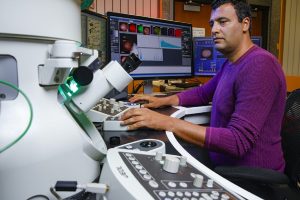
Multi-principal elemental nanoparticles are emerging materials with significant increase in their configurational entropy making them promising candidates for extreme service conditions. This presentation is designed to give the audience an overview of our on-going in-situ TEM research on such nanoparticles. At first, I would lay some basic foundations for multi-principal elemental materials and their unique structure and properties. Then, I will showcase some of our understanding on the synthesis of multi-principal elemental nanoparticles by thermal shock treatments on carbon support. Next, we demonstrate the possibility of electron-beam induced reduction of multi-principal elemental nanomaterials in liquid environment and the fundamentals that govern their nucleation and growth. At the end I will illustrate our in-situ gas-cell TEM studies on the chemical evolution of multi-principal elemental nanomaterials under high temperatures, oxidative, and reductive gases. Revealing the oxidative and reductive behavior of multi-principal elemental nanoparticles facilitates the development of advanced multicomponent alloys for applications targeting structural alloys, high temperature materials, corrosion-resistive materials, hydrogen embrittlement protection, and catalytic oxidation or hydrogenation. These studies are utmost importance for the promising applications of high entropy materials in catalysis, electronics, structural mechanics, and energy storage.
Dr. Reza Shahbazian-Yassar is a professor of Mechanical and Materials Engineering at the University of Illinois at Chicago, and a recipient of the University Scholar Award in 2021. He received his PhD in Materials Science from Washington State University in Pullman, WA. He started his career at Michigan Technological University in 2007 as an assistant professor and later was promoted to Henes Chair Professor of Nanotechnology. He has published more than 300 papers in journals such as Science, Nature Nanotechnology, Nature Energy, Nature Sustainability, PNAS, and many more. He has served as the President for Midwest Microscopy Society, a member of Steering Committee for ASME NanoEngineering for Energy Committee, and the former chair of the Advanced Characterization, Testing, and Simulation (ACTS) Committee at TMS.